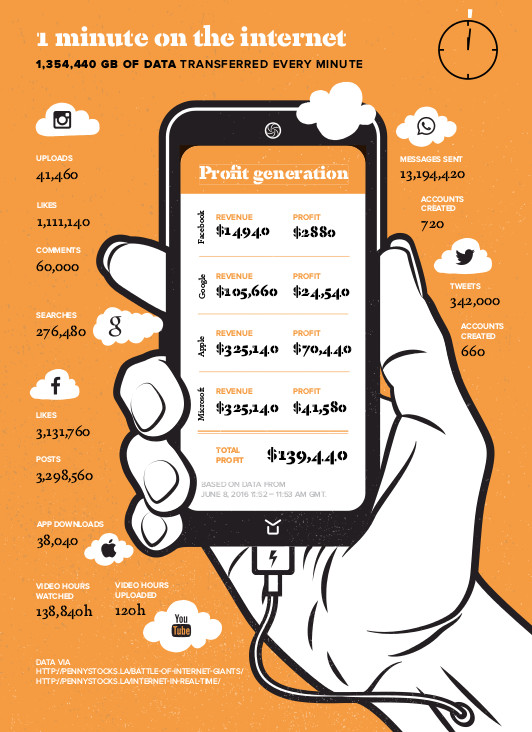Digital Labor
Google and Facebook are techno-parasites. They rake our data and squeeze us for profit. Let us demand remuneration. Let us demand data liberation.
Socialize the Internet!
- Issue #2
- Author
Life in the age of the datascape is wild. We can communicate with anybody, for free, the world over. We can meaningfully engage in the lifeworlds of our loved ones irrespective of their geography. We can drown in knowledge at the tap of a keyboard. We can map our way across unknown cities. We can create, edit and share text, sound, picture and video instantly, collaboratively, across multiple devices, on the fly. Our brains, thought patterns and subjectivities become technologically augmented. Search engines and social networks become extensions of the self.
The underside of our age is the heavy digital trace we leave behind. Every movement tracked by the location service on our smartphones. Every need, want and desire recorded as search terms. Our communication over phone, text and email potentially recorded. The content of our emails and instant messages algorithmically raked for themes and keywords.
This data—which is then collated, categorized and described in vast bulk as metadata—is an explosive store of value that has emerged over the last two decades. It is our lives, recorded, extracted and stored. It is information that, before the digital mediation and capture of human existence, was lost into the ether. And it is from these vast new data stores, these virtual representations of ourselves, that tech-monoliths such as Google and Facebook parasitically extract their value. It is for this that we must demand remuneration. It is against this privatization that we must demand data liberation.
Data-Parasites
Google and Facebook are hailed as either the benevolent providers of a beneficial, transformational and free digital infrastructure, or the practitioners of increasingly total, nefarious data gathering in aid of surveilling our every move. Neither of these two characterizations is quite correct. While services such as email, messaging, search and maps have both extended and transformed our communicative, intellectual and logistical abilities, they are not provided benevolently, nor are they provided for free.
Simultaneously, while these corporations do have the ability to build up incredibly detailed profiles on individuals, their aspirations are not totalitarian. They are not interested in liberating human potential, but neither are they interested in controlling us via surveillance. What they pursue is surplus value extraction. They aim to reproduce capital. As every other corporation, they chase profit.
 This is something Google and Facebook do incredibly well. While being worth nearly $800 billion combined—more than the total GDP of the Netherlands—they are also the two fastest growing corporations in the history of capitalism. And yet, it is initially mysterious as to where this value originates. Neither Google nor Facebook create any content, only an infrastructure that catalogs and ranks. Nor do they charge for their products or services, instead giving them away for free. Both have minute labor inputs when considering their size, the value of Facebook being nearly five times that of Starbucks while employing just 7 percent of the labor.
This is something Google and Facebook do incredibly well. While being worth nearly $800 billion combined—more than the total GDP of the Netherlands—they are also the two fastest growing corporations in the history of capitalism. And yet, it is initially mysterious as to where this value originates. Neither Google nor Facebook create any content, only an infrastructure that catalogs and ranks. Nor do they charge for their products or services, instead giving them away for free. Both have minute labor inputs when considering their size, the value of Facebook being nearly five times that of Starbucks while employing just 7 percent of the labor.
So how do these companies come to be valued so highly? It is because we—the consumer, user and producer—labor for Google and Facebook for free. We create the content that they index. We expose our lifeworlds to digital capture and enclosure. We let them mine us for data. Data that is then collated and described as metadata. Metadata which is used to serve us the precise, targeted advertising on which Facebook and Google’s revenue streams depend. By our very existence in the datascape, by becoming a digital being, our lives are squeezed for surplus value.
Data-Labor
Such a notion of hidden, data labor aligns with that of digital labor theorists such as Tiziana Terranova. Her work cataloging exploitation in the datascape and the existence of “digital sweatshops” has been important in de-glamorizing digital labor and exposing companies—such as the Huffington Post, who rely on vast swathes of unpaid writers—for what they are: exploitative of increasing precarity in the culture industry and elsewhere. But more than this, Terranova claims that labor is also diffuse, essential and existential. That merely by existing in the datascape, through the most basic forms of engagement, we are laboring in the interests of capital.
I will admit, this sounds peculiar. Using Google or Facebook does not seem like work. It is a leisure activity that we choose to pursue, or at the very least a convenient service that improves our lives. And while the latter is true, the use of these data-parasites is becoming increasingly difficult to avoid. As they institute themselves as the unseen infrastructure of both our digital and physical worlds, our increasingly coerced engagement begins to look a lot like labor.
Already, if we are to exist in the datascape, we cannot avoid data-mining services such as email, search and social media. Not owning an email address, for example, would result in exclusion from social networks, online shopping, online banking, most spaces of virtual community and nearly all forms of digital communication. Search is also unavoidable. Constructive engagement with the vast jungle of the web is impossible if one does not use Google or one of its competitors. At the same time, every major email and search provider will algorithmically rake over each word you type. Your thoughts, queries, communications and desires will be captured and transformed into valuable, privatized metadata.
We can go further than this, however. Increasingly, engagement with the datascape—and consequently these tech-parasites—is a prerequisite for a meaningful existence in the physical realm too. Email is an unavoidable necessity for vast swathes of twenty-first-century work. Search is essential if one is perform any labor with an informational component. Google maps are indispensable for the ever-increasing amount of precarious, freelance workers who have to navigate cities on the fly.
In this way, these data-parasites have come to establish themselves as the unavoidable, omnipresent infrastructure of a datascape upon which we increasingly depend for our own reproduction. Their use becomes normalized and expected. Our lifeworlds are increasingly channeled through them. More and more of our everyday action is mined for data, and produces value for these corporations.
Couple this unavoidability—this attempted existentiality—with the fact that our engagement is the main source of their value, that the data they extract is also their profit, and it seems obvious that our use of these data-mining services is labor. We cannot avoid it. We are coerced into performing it. It is directly productive of capital. We are data laborers.
Resistance in the Datascape
In light of this reframing, the tech dream of Google’s founders rapidly turns into nightmare. Sergey Brin wonders at the possibility of creating “a little version of Google that you just plug into your brain,” so that, as Schmidt puts it, “we would know enough about you to give you targeted information, the targeted news, the targeted advertising, to make the instantaneous, and seamless, happen.”
Revealed is Google’s intention to existentialize themselves totally. To occupy the most data-rich pastures. To attach their parasite to the source—our brains—and ensure the capture, enclosure and privatization of the totality of human cognition. Google would become biological, our every flicker of consciousness making them a profit.
Such wretched, dystopian futures can only be averted if we assert the reality of data labor and use it to interrogate current modes of resistance and inform potential alternatives. For example, if we continue to view struggles over privacy as panoptic rather than economic, as a fight against nefarious surveillance rather than surplus-value extraction, we will continue to obfuscate the extractive, data-mining intentions of these corporations.
One alternative tactic is to start analogizing the privacy policies of Google and Facebook to that of traditional wage contracts—with all the attendant struggles over pay, conditions and working hours. This reframing helps us to realize our true position in relation to these techno-parasites. We are not the grateful beneficiaries of free services as Silicon Valley claims. Nor are we the controlled and surveilled totalitarian subjects usually offered by the liberal left. Instead we are laborers. Laborers who should demand more than a smattering of free services as remuneration.
This has obvious and powerful implications for post-work politics. Srnicek and Williams, in their explosive post-capitalist treatise Inventing the Future, argue that the introduction of a Universal Basic Income will never gain any traction unless a counter-hegemonic project to radically undermine the work ethic is actioned in tandem. Such a task will be difficult, however, if popular definitions of labor fall within the traditional co-ordinates as quantifiable, enumerated by the hour and explicitly and obviously coerced. However, if we can popularize a concept of labor as dispersed, continuous and enmeshed with the digital infrastructure upon which our lives depend, a form of remuneration that is similarly generalized, such as the Universal Basic Income, begins to make sense.
Another realization this reframing brings is the potential of metadata as a new value store, and the velocity at which it is being captured and privatized. Before, when we looked up information in a book or asked another human being face to face, these externalities were immediately lost—vanishing into the ether. But in the data age, our wants, needs, desires and creative capacities—or our “general intellect” as Marx called it in the Grundrisse—are digitized and recorded.
We must conceptualize these networks as a new form of social machinery, a new mode of production from which we could reap immense amounts of value—evidenced in the incredible growth of Facebook and Google—if only they were liberated from private enclosure. This is not to claim, as many tech utopians of both the left and right do, that the proliferation of information alone will cause the emergence of a post-capitalist, post-scarcity era. Instead, it is to recognize that the data age has brought with it an immense new value store, and that the potentials for its use—by individuals through networked, open source production—are only just beginning to be realized.
Techno-Futures
The arguments above might tempt many on the left to adopt a techno-rejectionist stance. Of the more traditional left this would be an implicit tendency borne from inertia and dogma. Orthodox notions of the factory as the site of production and the proletariat as the revolutionary class still prevail, and in various ways conflict with social reproduction, digital multitudes performing data labor and, more generally, the importance of new informational, immaterial developments within capitalism.
 On the “new left”, we find a layering of technological rejection and embrace. While on one level we see an ardent embrace of capitalist technologies as a means of amplifying struggle, there is also a concurrent impulse that prizes the local, the immediate, the bodily and the geographically situated above all else. Be it the occupations of squares, assemblies on street corners or direct actions against arms manufacturers, airport expansion or open pit coal mining, all are examples of a political practice that prizes the unmediated as genuine.
On the “new left”, we find a layering of technological rejection and embrace. While on one level we see an ardent embrace of capitalist technologies as a means of amplifying struggle, there is also a concurrent impulse that prizes the local, the immediate, the bodily and the geographically situated above all else. Be it the occupations of squares, assemblies on street corners or direct actions against arms manufacturers, airport expansion or open pit coal mining, all are examples of a political practice that prizes the unmediated as genuine.
While such a localist orientation is at the heart of countless solidarity initiatives, social centers, cooperatives and community projects that could one day form the basis of a decentralized, stateless society, there is a temptation in such forms of organizing to forget about the network itself. To overlook the value of global technologies. To retreat from the analysis and liberation of communicative and informational networks that have been captured by capital—precisely because they are not locatable, visceral and immediately experienced.
We must resist these temptations vigorously. While the urge to reconstruct a pre-datascape world is wildly unpopular—who would want to give up Google?—it would also be a disastrous retreat from the utopian horizon if we were to cower in the face of these complex global technologies. Instead, we must construct a radical vision of how we can seize and shape these tendencies in the datascape to our advantage. We must embrace the future as our natural terrain. We must endeavor to make it our own.
Two proposals immediately become obvious. The first is a Universal Basic Income funded by a tax on these techno-parasites. Flowing from the recognition of our hidden, existential data labor, it would represent an appropriate and explicit remuneration for our online activities, recognizing the generalized and unquantifiable nature of this labor and the fact that, in different ways, we all create and reproduce the datascape.
However, such a move would remain moderate, akin to upgrading barely paid labor to a form of waged labor. The real goal, which Paul Mason suggests in Postcapitalism: A Guide to our Future, is not only the recognition and remuneration of our data labor, but access to and the ability to utilize these vast quantities of previously uncaptured data, via open source, peer-to-peer modes of production.
Presently there is incredible data asymmetry. Whereas data-parasites, governments and more traditional corporations know incredible amounts about us, we know so little about each other. We know so little about society writ large. We can only begin to imagine the possibilities such stores of metadata may bring if they were used for the public good, in common.
It is essential that we liberate this data from private hands. It is imperative that we socialize the vast wealth these data-parasites extract. It is time we began socializing the Internet.
Source URL — https://roarmag.org/magazine/socialize-the-internet/
Next Magazine article
Basic Income and the Future of Work
- Daniel Raventós, Julie Wark
- June 25, 2016
Will Robots Take Your Job?
- Nick Srnicek, Alex Williams
- June 25, 2016


